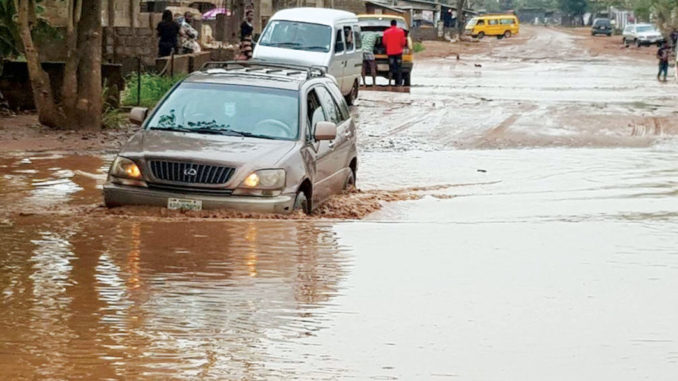
The recent charge by the Minister of Water Resources, Suleiman Adamu, that states, not Federal Government should tackle flooding would have been meaningful if the states had full control of their resources under a truly federal system of government. That, unfortunately, is not the case today in Nigeria.
Nigeria’s flawed federal system in which the Federal Government controls the resources of the land while states are virtually left at its mercy has become an albatrous on the neck of the people. The states are disenfranchised and alienated from their resources with the result that they go cap in hand, every month, to the Federal Government to beg for financial allocation. This leaves the states at a disadvantaged position.
The states therefore lack the capacity to effectively govern. States need capacity to be able to do things including controlling flooding. What the minister has suggested, in effect, is federalism, which is currently on the front burner. States should own their resources to be financially buoyant. Currently, there is unitarism and Nigeria living a lie. The over-centralisation of governance therefore hampers development.
While it must be acknowledged that the Federal Government alone has the capacity to tackle major flood disasters, the states and local council authorities must also play preventive role. As the minister rightly pointed out, states should stop building in flood-prone areas; stop giving such building permits; discourage illegal construction of buildings on water courses; clean up water drains regularly to ensure that water is allowed to flow. They should also create artificial flood plains and allow natural flood plains to remain because they absorb major run-offs from the cities. It is up to the states to do their best by ensuring that the natural environment is not obstructed to free water flow.
Whereas, the Federal Government provides information, especially, with regard to Annual Flood Outlook (AFO), through which flood warning is issued, some states and local government authorities don’t take the warnings seriously. Consequently, they do nothing to prevent flooding communities and infrastructure. Only a few like Lagos State are conscious of flooding as an issue that requires attention.
Reacting to an enquiry as to what the Federal Government was doing to prevent flooding following the release of the 2018 Annual Flood Outlook, the minister emphasized that it was not the responsibility of the Federal Government to take preventive measures but can only provide information. But there should be no clear-cut redline beyond which the Federal Government could not go for a disaster that affects everyone.
Given the phenomenon of climate change and its damaging impact, providing information alone would not be enough. The Federal Government should support states from the devastating effects of natural disasters. Critical infrastructure needed to checkmate flooding must be built. Such structures need huge funding that some states can hardly afford.
The 2018 AFO states that 380 local government areas in 35 states would experience flooding this year. That, in effect, means that virtually the entire country would be affected. It is good that this warning is released early enough for proactive action to be taken, especially in the Niger Delta and along the Niger Benue trough to prevent disaster.Effective natural disaster management requires early warning signal for impacts mitigation but concrete action should be taken by all.
The Nigeria Hydrological Agency (NHSA) projected that Sokoto, Niger, Benue, Anambra, Niger Delta, Anambra, Ogun-Osun, Cross-River and Yobe states would have high risks of river flooding. It also indicated that Lagos, Bayelsa, Rivers, Delta, Ondo states may likely experience coastal flooding. The flooding is attributed to a likely rise in the sea level and tidal surge, which would impact fishing and coastal transportation.
Furthermore, flash and urban floods are expected to occur in Port Harcourt, Sokoto, Lagos, Ibadan, Kaduna, Yola, Abuja, Maiduguri, Makurdi, Calabar, Jos, Owerri, Oshogho and Ilorin.
Others are Awka, Abakaliki, Birnin-Kebbi, Kano, Yenagoa, Abeokuta, Ado-Ekiti, Lokoja, Lafia, Nsuka and Gombe. Also included are Suleja, Karu, Nyanya, Abaji, Onitsha, Sapele, Hadejia and other major cities with poor drainage.
The water levels in the River Niger and Benue, among other major river systems, would rise and remain high during the rainy season. There is concern that some dams in the country are getting silted up, thereby reducing their storage capacity. This would cause a lot of the water to be spilled through the waterways.
Given that the rainy season is bound to generate seasonal flooding across the country, it is necessary for government and the people to take proactive measures to prevent loss of lives and property, damage to crucial infrastructure, disruption of socio-economic activities and even displacement of people in flooded areas. Evacuation of people living in the danger zones is a sure way to save lives.
There should also be public enlightenment, at the community level, to sensitise the public. Traditional rulers, council chairmen, community and youth leaders should rally to educate the people in their domains. They should ensure that blocked drainage channels are cleared and the flood warning should not be ignored to avoid unpleasant consequences.
END

Be the first to comment